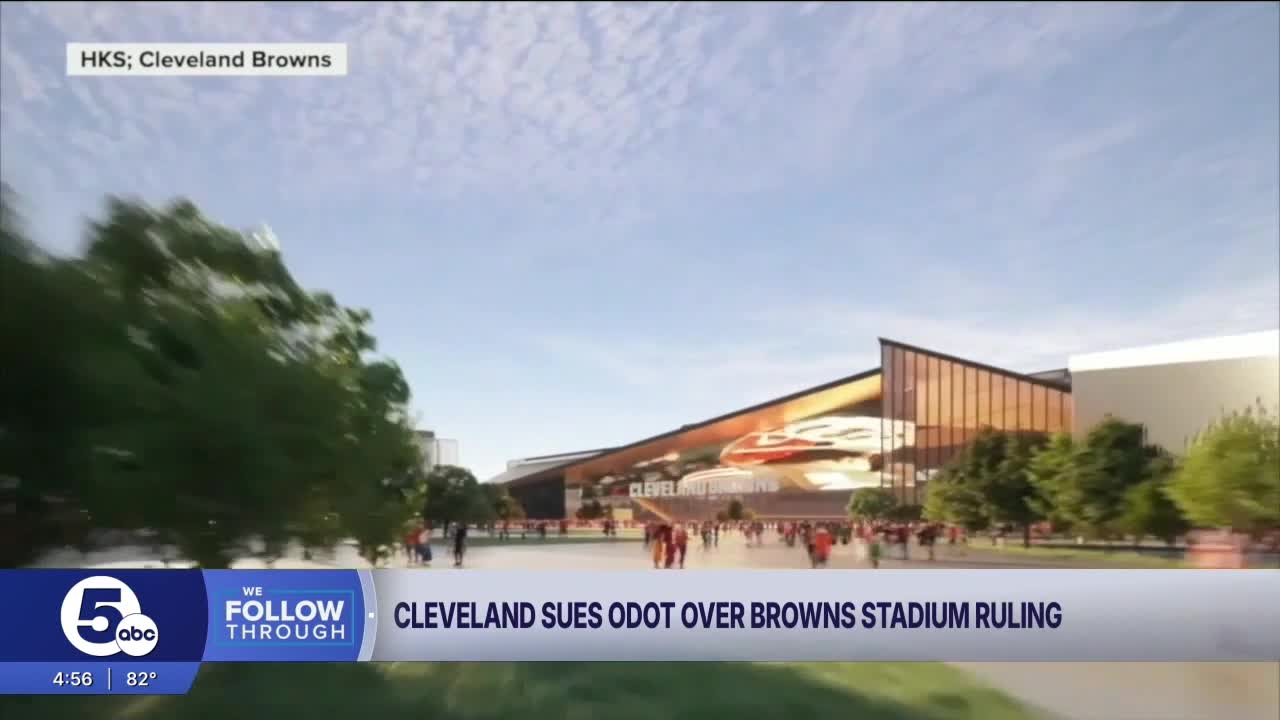CLEVELAND — Add another lawsuit to the pile of litigation over the Cleveland Browns’ plans to build a new, enclosed stadium in Brook Park.
The city of Cleveland is challenging the Ohio Department of Transportation over the state agency’s recent decision to issue a construction permit, and waive obstruction standards, for the stadium just east of Cleveland Hopkins International Airport.
The lawsuit, filed Friday in Cuyahoga County Common Pleas Court, resurrects an airspace battle that seemed to be settled — just as the Browns are ramping up site preparations in Brook Park, with an eye on a spring groundbreaking.
RELATED: Cleveland Browns announce construction team for new enclosed stadium in Brook Park
Cleveland’s Department of Port Control, which runs Hopkins, filed the appeal “out of abundance of caution in order to provide a safe and secure environment for all passengers, visitors and employees,” lawyers for the city wrote in the court filing.
The court action sets the stage for a public hearing on a debate that has largely taken place behind closed doors.
ODOT issued a permit and a waiver for the stadium development on Sept. 18, reversing its stance on the project after working with an outside aviation consultant.
RELATED: ODOT approves Browns' Brook Park stadium plans
The agency initially rejected the proposal in August, citing pushback from Hopkins over the stadium’s height.
RELATED: ODOT rejects new Browns stadium as too tall. Browns push back, citing FAA's OK.
Public records show the project will reach 58 feet into protected airspace. Still, the Federal Aviation Administration signed off on the development in May, saying the stadium won’t be a hazard — but must have red warning lights on the roof.
ODOT originally sided with Hopkins, though, citing its practice of deferring to local airport authorities in these cases. In August, the state agency said the Browns would have to reduce the height of the stadium project, shift the development to another location or file an appeal and seek a hearing.
Team owner Haslam Sports Group and its aviation consultants never filed a formal appeal. There was no hearing. Instead, ODOT reviewed additional documents provided by Hopkins and Haslam Sports Group and hired an outside consultant to look at the project.
Then the agency changed its stance, clearing the stadium for take-off.
“All along our goal has been to ensure that all concerns were heard and addressed, and a resolution could be found,” ODOT Director Pamela Boratyn said in a news release in mid-September.
At the time, Haslam Sports Group President Dave Jenkins applauded the decision, saying, "safety is of paramount importance to all of us and was at the forefront of our detailed and deliberate process with our FAA consultants, whom we engaged with well before our architects began designing the stadium."
Officials at Hopkins, meanwhile, said they respected ODOT’s decision – but didn’t agree.
“Any project with the potential to affect the airport’s operations is a major concern. … Development matters, but not if it comes at the expense of the airport’s safe, efficient and reliable operations,” an airport spokeswoman wrote in a statement last month.
Now it’s clear the city isn’t ready to back down.
In their appeal, Cleveland’s lawyers said “ODOT’s decision is not supported by reliable, probative and substantial evidence.”
On Monday, an ODOT spokesman said the agency doesn't comment on pending litigation.
A Haslam Sports Group spokesman also declined to comment on the appeal.
A spokeswoman for Hopkins said airport officials were not available for an interview Monday about the effort to challenge ODOT's determination.
"The department maintains that this decision could have implications for the airport’s continued safe and efficient operations," Megan O'Connell, assistant director of marketing, communications and guest experience for the department of port control, wrote in an emailed statement. "Ensuring the highest levels of safety and reliability remains our top priority."
The lead attorney for the city is Justin Herdman, a partner at Jones Day – the same lawyer who is representing Cleveland in a legal battle with the Browns over the team’s existing lease at city-owned Huntington Bank Field and the so-called Modell law.
State lawmakers recently changed the Modell law to clear the way for the Browns’ move to Brook Park. The law, designed to make it harder for professional sports teams to leave taxpayer-subsidized facilities, requires team owners to get a host community's approval to move or to give local investors a chance to buy the team.
The revised language makes it clear that the law only applies to teams that are looking to leave the state.





